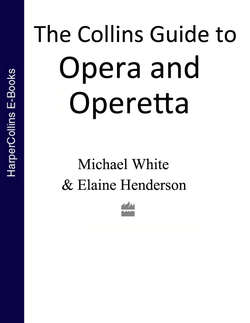Читать книгу The Collins Guide To Opera And Operetta - Michael White - Страница 54
ОглавлениеAdriana Lecouvreur
FORM: Opera in four acts; in Italian
COMPOSER: Francesco Cilea (1866–1950)
LIBRETTO: Arturo Colautti; from the play by Scribe and Legouvé
FIRST PERFORMANCE: Milan, 6 November 1902
Principal Characters
Adriana, an actress Soprano
Maurizio, Count of Saxony Tenor
Michonnet, stage director Baritone
Prince de Bouillon Bass
Princess de Bouillon, his wife Mezzo-soprano
Abbé de Chazeuil Tenor
Synopsis of the Plot
Setting: Paris; 1730
ACT I At the theatre, Adriana confides to Michonnet, who adores her, that she loves an officer in the Count of Saxony’s service. They are interrupted by the officer himself (actually the Count in disguise) who immediately declares his love for Adriana; before leaving for the performance, Adriana gives him some violets for his buttonhole. The Prince and the Abbé then enter, discussing a letter they have intercepted, addressed to Maurizio and arranging an assignation at the villa of the Prince’s mistress, Adriana’s actress rival, Duclos. The two men allow the letter to be delivered to Maurizio, who realises that the writer is not Duclos, but the Princess, a former lover. He decides to keep the appointment for political reasons. Adriana, meanwhile, is invited by the Prince to join an after-theatre party at the villa.
ACT II Maurizio and the Princess meet, but the Princess is upset to see the violets he is wearing and accuses him of having another lover; with great presence of mind he says they are a gift for her. At that moment they are surprised by the arrival of her husband and the Abbé, and the Princess hides in the next room. When Adriana arrives she recognises Maurizio as her ‘officer’ and they reaffirm their love. Maurizio asks Adriana to help the woman in the next room to escape. Later, in the dark, the two women discover that they are rivals for Maurizio’s love.
ACT III The Prince and Princess are holding a party. Among the guests is Adriana, whose voice the Princess recognises as that of her rival for Maurizio. When Maurizio himself comes in, the two rivals resort to charge and countercharge, ending with Adriana declaiming a passage from Racine’s Phèdre about lustful women while looking the Princess straight in the eye.
ACT IV Adriana is deeply depressed, believing that Maurizio no longer loves her. Her misery is compounded by the delivery of a box ‘from Maurizio’ containing the violets that she had given him. Sadly, Adriana kisses them and throws them on the fire. At that moment Maurizio himself comes in and asks her to marry him. Adriana is overjoyed. But suddenly she turns pale and faint. She accuses Maurizio of sending her poisoned flowers, which he denies, before dying in his arms. Michonnet, broken-hearted, knows that this is the work of the Princess, who has exacted the ultimate revenge.
Music and Background
Adriana Lecouvreur is generally said to be a fine opera for a fine soprano past her prime: in other words, the title role makes enough demands to be challenging but without too many top notes. As verismo writing goes, it is comparatively restrained and subtle.
Highlights
Adriana’s Act I ‘Io son l’umile ancella’ is sort of motto theme that recurs throughout the score. Her Act IV ‘Poveri fiori’ is the other show-stopper.
Recommended Recording
Joan Sutherland, Carlo Bergonzi, Welsh National Opera/Richard Bonynge. Decca 425 815-2. Sutherland in peak, grand-tragic form.
